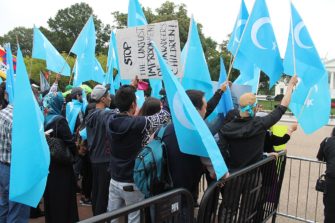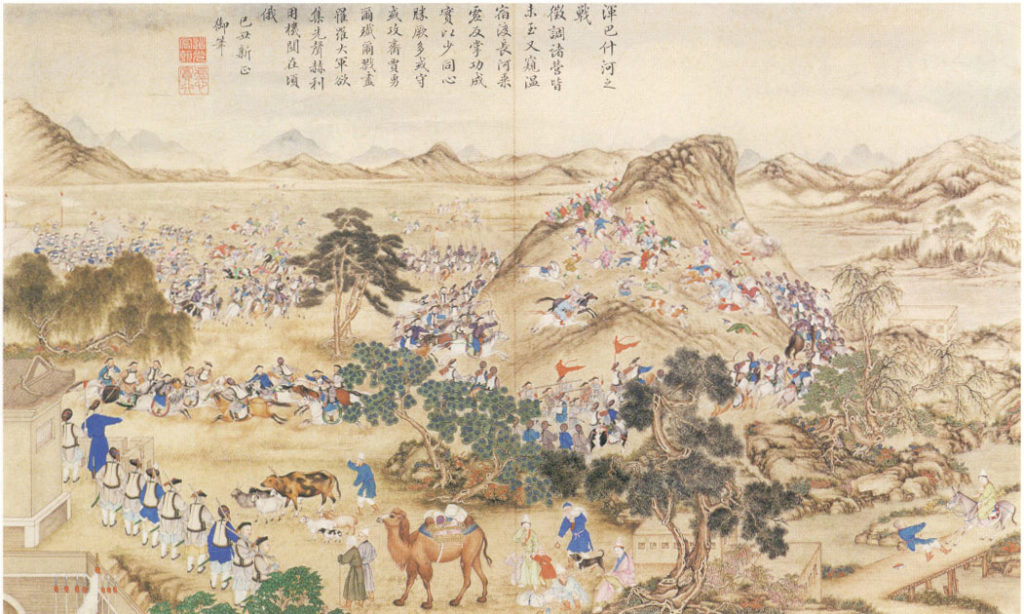
For Uyghur people to thrive, the principles of pluralism and human dignity need to be promoted in China. This requires that Uyghurs be made visible and allowed to speak in their own voice. It is necessary, therefore, to create a transformative imaginary that promotes dialogical and dialectical processes of real social transformation. Such an imaginary would involve supporting Uyghur subjects in their struggle against forced assimilation and retrieving them from a subordinate position to those in power. In support of this imaginary, academic and intellectual spaces that confront the Uyghur issue need to be created. This requires creating new forms of social understanding from non-Eurocentric perspectives as well as new strategies for creating knowledge that go beyond the colonial and North-centric legacies of the current social sciences. It also requires delving into pluralistic forms of constructive social thinking that are emergent in different places in the “South,” including the Uyghur region. To inhabit the South is not to merely side with those coming from a particular geographical region. It is to metaphorically place oneself on the side of those who suffer from the harms caused by nation- and global-scaled capitalism and colonialism, and against those who would minimize the claims or lives of those who suffer and/or suggest they “get over” it.
Since post-colonial times have not (yet) come for the Uyghurs, a decolonial approach to the Uyghur issue must start by assuming the colonial nature of the relations between the Chinese nation-state and both the Uyghurs and their homeland. This requires recognizing Chinese colonialism’s proper characteristics and avoiding the universalization of European colonialism as practiced in the seventeenth and eighteenth century as “the only possible colonialism.” The domination of the Uyghurs by the Chinese state is a form of “colonialism” if by colonialism we mean an ancient practice of conquest, usurpation, and subalternization. Such a definition requires that we don’t fall into the “salt water fallacy.” If we analyze the last two and a half centuries up until the present of what today is the Xinjiang Uyghur Autonomous Region, we will see that it is a colonial history. Many Uyghur scholars have pointed this out—though not openly until very recent times. A colonial—Chinese, in this case—extractive logic leads to the confiscation of the potentialities of land and bodies, and reduces the colonized to “subaltern” categories: (1) residents of extremely poor enclaves; (2) undocumented migrants / illegal exiles; (3) enslaved workers; (4) racialized populations; (5) objects of gender discrimination.
The Uyghurs’ territories and resources are appropriated by the dominant class, and impoverished by extensive farming and labor-intensive industries. The urbanization and subsequent gentrification of the Uyghur landscape, jointly with asymmetric resource management and racist segregation, turn huge percentages of Uyghurs into residents of extremely poor enclaves, and exclude them from the formal labor market. This often leads them to emigrate towards other regions/countries looking for better opportunities. However, the state restrictions on their ability to obtain passports and documents force a conspicuous number of Uyghurs to illegally abandon their region, turning them into undocumented migrants/illegal exiles. Although exile can easily be considered a condition that denies dignity and an identity to people, in this case it is practically the only form of survival for excluded people. The totalitarian nationalism of the People’s Republic of China provokes, among other consequences, their urgency to rebuild as people and individuals living in exile. It also requires them to deal with feelings of rejection and isolation once they settle in a foreign land.
The Uyghur Situation Today
Since mid-2017 the Uyghur situation has received more visibility on the international scene. This occurred when intellectuals and activists from both the Uyghur diaspora and within Chinese borders reported that the Chinese Communist Party had opened alleged vocational reeducation camps. Those correctional facilities act as sites where Uyghurs and peoples of other nationalities can be transferred to Chinese and foreign factories as enslaved workers.
The official façade that has enhanced the success of those centers is the People’s Republic of China’s (PRC) embrace of the narratives and strategies of the post-9/11 Global War on Terror. It paints this effort as a struggle to contain terrorism within its territory while allegedly modernizing the region and increasing harmony among the 56 nationalities of China. In doing so, the Chinese government legitimizes its own particular state-controlled anti-Muslim forms of racialization, hiding geopolitical and economic interests behind the well-accepted banner of the Global War on Terror. This strategy targets racialized populations and establishes religious and cultural repression over them. However, survivors and their families have started to make their stories public, either openly or anonymously. Among those are the testimonies of women forced to have abortions in the camps. While the official Chinese propaganda celebrates (in a now-deleted tweet from the Chinese embassy to the US) “that in the process of eradicating extremism, the minds of Uygur women in Xinjiang were emancipated […], making them no longer baby-making machines,” these strategies in actuality show the gender discrimination that the government promotes and its long-term strategy to commit a genocide against the Uyghur people. Also aiding in more recent international recognition was the subsequent forced disappearance of an increasing number of Uyghurs—and Kazakhs, Uzbeks, and other minority nationalities.
Decolonial Studies and the Uyghurs
The suffering of the Uyghur peoples has been carried out as a colonial project—with all the epistemic, metaphysical, and cultural assumptions that such a project entails—which has real world implications such as physical violence and cultural oppression. The support of these real-world catastrophes by the ruling ideologies of colonial powers is telling. It reveals the constructed nature of the ontological—hence, not (only) geographic—South as a dominated subaltern subject. For it is seen by colonial powers—including the Chinese state in this instance—as a problematic segment that must be controlled.
Over the last several decades decolonial studies have become more ubiquitous across multiple disciplines. They have opened new perspectives and new geographies to the social sciences research landscape. Although decolonial discourse originates from dialogues between intellectuals based in Latin America and the Caribbean, it has established links with projects born in other places, for any political proposal founded on the basis of epistemological universalism, as the Chinese statist universal project remains, is an imperial/colonial global design and is to be criticized as such. In the Uyghur case, this clearly appears both in the statist appropriation of Uyghur history that hides Uyghur history within a broader national narrative, and the assimilative “bilingual education” policy that has been imposed on the region. The modular history of the Uyghurs, which is made of routes interweaving shrines and religious places with myths and national history, is dismantled under the weight of official narratives. As this case demonstrates, decolonial studies ought not to rely on one kind decolonial thinking, but rather should facilitate local- and community-based dialogues across similar and different experiences, and it should do so in geographical and/or epistemic places outside of Latin America and the Caribbean. Thus, my decolonial proposal is to give voice to a series of actors/subjects that until now have been relegated to the non-scientific field of “memories/folklore.”
In recent years, most of the opposition to the Beijing regime’s oppression of the Uyghurs has come from within the US, both from governmental offices and associations of Uyghurs in the diaspora. This is due to the Chinese Communist Party’s extreme control over all Uyghur activity within the Xinjiang region. The geographic locus of opposition has caused adverse reactions from critical sectors of the global intellectual left, especially diaspora Chinese media collectives. Those criticisms, though rooted in prudent worries, frivolously and programmatically tie intellectuals and activists struggling in favor of Uyghur dignity with neoliberal ideologies hostile to the socialist bastion China represents. To overcome these adverse reactions, then, involves dissociating from this Cold War-generated dualistic and simplistic vision of neoliberalism vs. communism, the US vs. China, and Western democracy vs. Asian autocracy. Our role as intellectuals and activists is to highlight social injustices and offer viable alternatives to their perverse mechanisms.

Although the Global North/West has a long history in producing and consuming Asia and China symbolically—what has been called Cold War Orientalism—dealing with an empowered and subjecting actor like today’s PRC subverts as it simultaneously recreates Cold War dichotomies and structures. However, China’s very role in the world struggle against imperialism and capitalism—enhanced since the Cold War period with the Bandung Conference—should nowadays be critically scrutinized.
As various authors already pointed out in interviews and op-eds, and as so far shown in this post, the Chinese nation-state has established subalternizing relations with the Uyghur people. I, along with others, see the identity and cultural repression and ethnic genocide as a consequence of official state violence, imposed by the powerful for clear hegemonic—and, hence, economic—reasons. The ethnic repression and genocide are caused by an expanding and evolving Chinese capitalist society. The struggles that have arisen in response to the changes within global capitalism, such as the Belt and Road Initiative, and the modifications of the geopolitics of domination that have come with these changes (which have so far been controlled by the US) have led to the establishment of asymmetrical relations—and hence, violent ones. This is the direct consequence of a colonial epistemology which establishes hierarchical ontologies and attempts to invisibilize the subaltern. This creates, then, a North/South domination that reproduces a colonial pattern. This pattern repeats narratives about global “enemies” that have been employed throughout history. It labels groups of peoples as potentially dangerous for global security and welfare, and thus as worthy of being persecuted, oppressed, and made illegal. We can see this pattern in the yellow peril, passing through the kamikaze threat, the cholo gangs, and most recently the Kung-flu. These racial stereotypes have targeted the Chinese, Muslim, Latinx communities and now, the Uyghurs—that is, colonized/subaltern subjects—and legitimized violent and repressive policies against them.
To approach Uyghur studies from a “museistic” perspective—a sort of “theme park” showing purely historiographical, theological, anthropological facets—would mean, in my opinion, to perpetuate an “official,” “partial,” and hence, propagandistic, vision of Uyghur reality, as the official Chinese sources about Xinjiang’s history attempt to do. An approach that can properly address the situation that the Uyghurs face can hardly be inscribed in the sealed compartments of traditional academia. Traditional forms of academia are, after all, complicit in hegemony. In other words, the commitment to “hybrid” and “mestiza” research, which may dignify “other” forms of knowledge seems the only viable way to break with the epistemological tradition of a “North-colonial-nation-state-centric” world system. This form of research can reframe the ontological and epistemological underpinnings of the Uyghurs’ struggle for human dignity.
From a decolonial perspective, it is necessary to (1) recognize the state’s propaganda when analyzing the official history of the territory; (2) identify the socio-environmental and ecological hegemonic strategies taken towards the autochthonous populations; and (3) listen to the subaltern and dignify the “Small Voices of History.”
What has become “conventional” decolonial theory is not sufficient. The challenge I propose here, then, is to promote an Uyghur emancipatory thinking, in which different knowledges may coexist, and in which histories may be counterhegemonically reappropriated. This requires that we acknowledge our permission to narrate without taking away the voices of our subjects. By doing so, we can show how to attain the transformative imaginary mentioned at the beginning of this post: transcending this subject-object duality while traversing the route “from dualities to ecologies.” And that certainly is a difference that matters.

